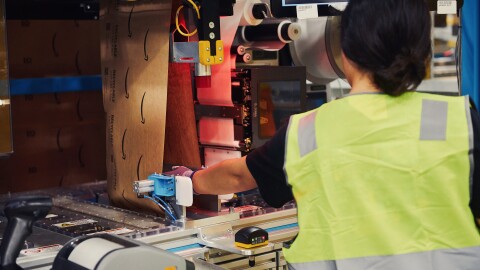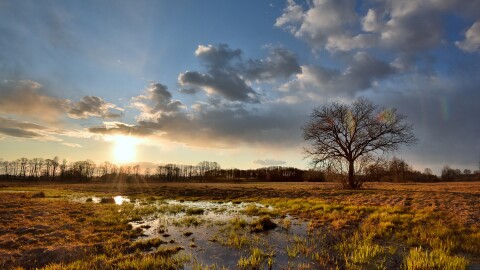Amazon and Conservation International announced today the establishment of the International Blue Carbon Institute. The Institute will help mitigate climate change and protect coastal communities by supporting the restoration and protection of coastal blue carbon ecosystems in Southeast Asia and beyond.
Blue carbon is the carbon stored in coastal and marine ecosystems, such as mangroves, seagrasses and tidal marshes. These ecosystems sequester and store large quantities of carbon in both the plants and the sediment below, and due to this are recognised as an essential part of the solution to global climate change.
This content is hosted by a third party (www.youtube.com).
To view the content, you need to consent to cookies by selecting Accept all in the popup banner. Or you can go to the site footer, select Cookie Preferences, and then select On under Functional Cookies, Performance Cookies and Advertising Cookies.
The International Blue Carbon Institute will be housed in Singapore and will focus on supporting Southeast Asia and the Pacific Islands in realising their immense blue carbon potential. Southeast Asia holds over one-third of the world’s mangrove forests, however, the greatest loss of mangrove forest has also occurred in this region[1]. In Asia through to the Pacific Islands, coastal communities are increasingly vulnerable to sea-level rise and stronger storms. Blue carbon ecosystems fortify communities against climate effects while providing fresh water, supporting biodiversity, and other natural benefits.
The International Blue Carbon Institute, with support from the Singapore Economic Development Board, will serve as a knowledge hub to build capacity, expertise, standards and methodology to develop and scale urgently needed blue carbon projects.
Integrating blue carbon into climate change policies
The Institute will work with governments across Southeast Asia and beyond to integrate blue carbon into climate change mitigation policies at international, regional, and local levels. It will expand education for practitioners, policymakers and communities to access the latest scientific knowledge, standards, best practices, and resources on blue carbon projects. The Institute will also partner with academic institutions, NGOs, private sector and governments to develop key tools for advancing blue carbon, including carbon credit methodologies and standards, policy frameworks, and field techniques.
In the first year, this will include focusing on building tools to support science-based restoration of blue carbon ecosystems, developing key guidance on blue carbon in Nationally Determined Contributions (NDCs), and expanding the knowledge related to the climate value of seagrasses and kelp ecosystems.

Photo by ©Burt Jones and Maurine Shimlock
Emily Pidgeon, Vice President, Ocean Science and Innovation, Conservation International, said: “Blue carbon ecosystems are some of our planet’s most carbon-rich, yet globally threatened ecosystems, and as such are one of the world’s most important conservation priorities. Conservation International is excited to collaborate with Amazon on the International Blue Carbon Institute to realize the climate mitigation and adaptation potential of Southeast Asia and the Pacific’s blue carbon ecosystems, and achieve high-quality, lasting results for coastal biodiversity, resilient communities, and our climate.”
“Our organization is dedicated to catalyzing coastal conservation and restoration through the highest quality blue carbon projects and investments and is working to deliver the essential knowledge and tools that are the foundation for including blue carbon in policy and incentive mechanisms.”
As part of its ongoing commitment to nature-based solutions, Amazon will provide a grant of up to US$3 million to establish and fund the Institute’s operations for the first three years to help the region build and scale credible blue carbon projects.
“At Amazon, we have been investing in nature-based solutions to mitigate carbon emissions outside of our value chain and supplement the carbon-reduction efforts we’re driving across our operations. There is strong potential in blue carbon projects to support carbon sequestration, ecosystem services, and livelihoods in Southeast Asia and the Pacific, which is home to rich marine and coastal environments. In the fight to combat climate change and preserve biodiversity, we will need both large-scale and local action – and Amazon remains committed to investing in both”, said Kara Hurst, Vice President of Worldwide Sustainability, Amazon.
Yeoh Lam Keong, Chairman of Conservation International Singapore Conservation Trust said “Conservation International’s presence in Singapore has grown tremendously since becoming a registered charity and Institution of Public Character five years ago.
Besides a growing school environmental education program and a pioneering new sustainable financing fund for environmental projects in the region, Conservation International’s International Blue Carbon Institute is a central pillar which supports the delivery of the urgently needed blue carbon research and science to help mitigate the climate crisis”.
Supporting nature-based solutions around the world
Conservation International has led global science and action on blue carbon, in close collaboration with governments, research institutions, NGOs, and coastal communities around the world. The organization has advised governments—including Ecuador, Costa Rica, Fiji, and Colombia – on blue carbon policy, conservation management, and climate mitigation strategies. Conservation International collaborated on the first blue carbon project certified by Verra (Verified Carbon Standard) to focus on mangrove conservation in Colombia.
Further, in partnership with the International Union for Conservation of Nature (IUCN) and the Intergovernmental Oceanographic Commission of UNESCO, Conservation International formed the International Blue Carbon Initiative, which has advised the integration of blue carbon ecosystems in the IPCC guidelines for Greenhouse gas accounting, the development of methodologies for blue carbon crediting and the integration of blue carbon into NDCs.
To support nature-based solutions, Amazon created the Right Now Climate Fund in 2019, a US$100M fund to restore and conserve forests, wetlands and grassland around the world. In 2021, Amazon also helped create the LEAF Coalition (Lowering Emissions by Accelerating Forest Finance), a global initiative of governments and leading companies that has already mobilised over US$1 billion to protect the world’s tropical rainforests. This public-private initiative aims to halt tropical deforestation globally in the next decade, through jurisdictional approaches to reducing emissions from deforestation.
Also in 2021, in partnership with The Nature Conservancy, Amazon developed the Agroforestry and Restoration Accelerator in Brazil, which is expected to remove 10 million tonnes of CO2 from the atmosphere by 2050.
Amazon continues to support nature enhancement in the communities it serves, such as the Family Forest Carbon Program in the U.S., the Urban Greening project in Berlin, Germany, Parco Italia tree planting in Milan, Italy, and rewilding projects in UK.












